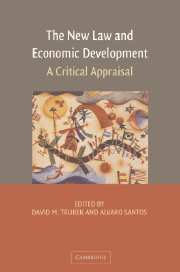Book contents
- Frontmatter
- Contents
- Contributors
- 1 Introduction: The Third Moment in Law and Development Theory and the Emergence of a New Critical Practice
- 2 Three Globalizations of Law and Legal Thought: 1850–2000
- 3 The “Rule of Law” in Development Assistance: Past, Present, and Future
- 4 The “Rule of Law,” Political Choices, and Development Common Sense
- 5 The Dialectics of Law and Development
- 6 The Future of Law and Development: Second-Generation Reforms and the Incorporation of the Social
- 7 The World Bank's Uses of the “Rule of Law” Promise in Economic Development
- Index
5 - The Dialectics of Law and Development
Published online by Cambridge University Press: 06 July 2010
- Frontmatter
- Contents
- Contributors
- 1 Introduction: The Third Moment in Law and Development Theory and the Emergence of a New Critical Practice
- 2 Three Globalizations of Law and Legal Thought: 1850–2000
- 3 The “Rule of Law” in Development Assistance: Past, Present, and Future
- 4 The “Rule of Law,” Political Choices, and Development Common Sense
- 5 The Dialectics of Law and Development
- 6 The Future of Law and Development: Second-Generation Reforms and the Incorporation of the Social
- 7 The World Bank's Uses of the “Rule of Law” Promise in Economic Development
- Index
Summary
The story of Law and Development (L&D), that is, the legal movement or discipline, not the conceptual relationship between law and economic development that it addresses, is by now more than thirty years old. What is to be gained from yet another retelling, from this present vantage point? For one, the original telling has long since itself become an episode of a longer and more elaborate sequence, a tale within a tale. For another, the story has ceased to be a mere parochial disciplinary genealogy, because it has been taken up by all sorts of other narrators, and come to include all sorts of other characters. The L&D story is a story of development in a double sense: it is necessarily about economic development as the object of theoretical and practical exertions, but it is also about historical development as the contingent unfolding of those exertions, development as twists and turns (or moments), and the occasions (or mediations) that precipitate the twists and turns. These are the dialectics of L&D, which parallel and respond to, but with interesting deviations from, the dialectics of development theory itself. I think an account of the dialectics of L&D is both overdue and potentially useful. My hope is that it can serve both a diagnostic and heuristic function, if we are really to unleash the critical potential of L&D, which has sometimes seemed a failed promise or missed opportunity.
- Type
- Chapter
- Information
- The New Law and Economic DevelopmentA Critical Appraisal, pp. 174 - 202Publisher: Cambridge University PressPrint publication year: 2006
- 5
- Cited by



